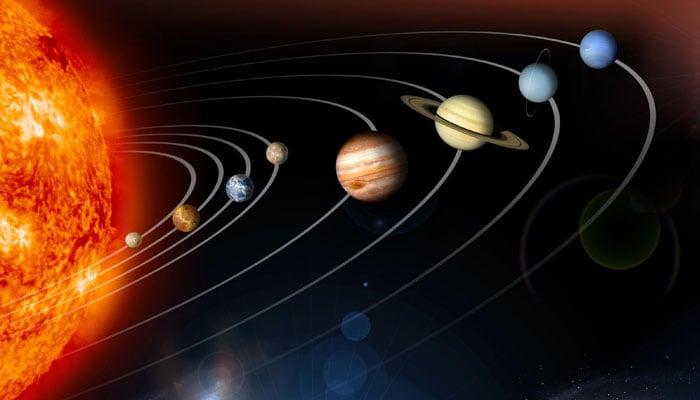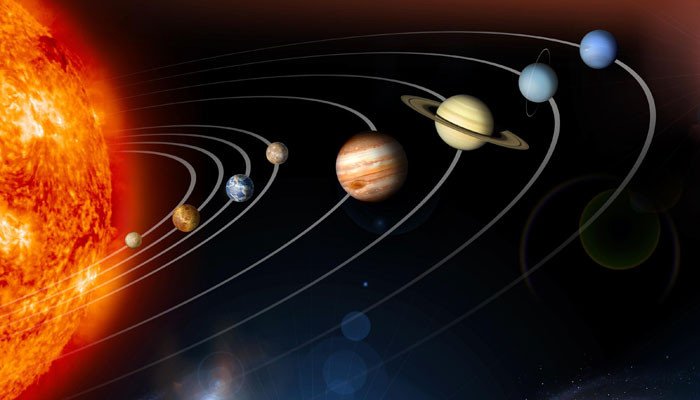
The scientific awareness and research of science and the people of science has revealed to some extent the hidden reality of the astronomical system, which is still ongoing, that the planets, moon and millions of comets and asteroids revolve around the sun in the form of complex orbits. Time is moving. Apart from this, there are also a large number of dust grains, gas molecules and atomic particles. All these celestial objects have at least one thing in common. That is, all celestial bodies are subject to a powerful force of attraction and repulsion around the Sun. The Sun and all the other planets are held firmly in place by this force, which gives rise to a cosmic system known as the Solar System, each member of which follows a specific orbit around the Sun. There is an integral part.
This orbit is a balance between the Sun’s delicate gravitational force, which pushes the object inward, and the body’s own inertia (which tends to throw the object out into space). Any body in space that revolves around a larger body in a separate, specific orbit is called a satellite. In this context, the Earth is a minor planet orbiting the Sun at a speed of 66,600 miles per hour. This acceleration does not allow the Earth to fall into the Sun, but rather maintains the average distance between the Earth and the Sun at about 93 million miles. The other members of the Solar System have their own individual orbits, whose distance from the Sun is determined by specific speeds and distances.
In addition, some experts believe that the number and types of orbits in the solar system are also the reason for the collision of celestial bodies with each other. It is a thought-provoking concept that has been affecting the human mind for centuries, for which solid arguments have not come out. This is the reason why the creation of the solar system remains as a hypothesis even today, but some possibilities have been revealed in terms of research and astronomical information so far, in the light of which some aspects of the creation of the “solar system” have been revealed. can be brought. Generally, the information about the collision comes from the fact that the stars are far away from each other and in different positions.
Even in the same “galaxy” they remain at a distance. Therefore, the probability of their collision is considered very low, but in 1749, according to an astronomer at the University of Chicago, a hypothesis about the collision between the sun and other planets began to be heard far and wide in scientific circles, which was called “Pliny”. Named the “planetesimals” hypothesis. The discovery began to gain momentum regarding the hypothesis that large amounts of material were ejected from the Sun when the Sun collided with other stars. The hot components cooled down into small bodies (planetesimals) and then they gradually joined each other and thus the planets were born.
For a long time this hypothesis remained in place after modification, but with the passage of time, this idea became incorrect and unpopular, as it showed the same aspect that material was being pulled away from the Sun due to the gravitational pull of other stars. They came close to each other but did not collide, because all the arguments made clear the fact that the matter from the sun or the star from which it was obtained was in the form of gas and was scattered in the atmosphere before it solidified. , on the basis of which this hypothesis became unpopular. In 1755, the German philosopher “Kant” introduced another hypothesis regarding the solar system and expressed the idea that the gas clouds were circulating in the space. It was actually a “nebula” which was its own. axis and was rotating in the same direction.
Before that, it was thought that fifteen billion years ago there must have been an endless space, which perhaps cannot be covered by human imagination. Cold and gas bubbles or balls were constantly circulating in this space. Gradually these particles came closer to each other and then a huge rotating saucer came into existence. This was given the name “Nebula”. But in 1796, a mathematician, Lapis Lazuli, expressed the view that this hypothesis had no mathematical analytic information. For this reason, the mathematician further refined this hypothesis in the light of the law of physics, “Law of Conservation of Angular Momentum”, and tried to reveal the fact that when the “nebula” is surrounded by the gravitational force. became shorter and shorter under the influence of , due to which its rotation speed increased.
According to the “law of conservation of angular momentum” in physics, the value of angular momentum or MVR is always constant. If the value of R (R.) i.e. the diameter of the orbit decreases due to contraction, the rotational velocity increases proportionally, so according to this law, the outer part of the “nebula” is very It began to circulate rapidly. As a result, these plumes or saucers of gas and smoke broke away from the shrinking “nebula” body. They split into planets and asteroids and began to move around in separate orbits, including our Earth.
The outer part of the planet Earth gradually cooled, but its core is still hot, which is a hot mixture of molten iron, nickel and other metals. According to the latest research on the solar system, “NASA” in June 1977. And astronomers from the University of New Mexico have derived information from astronomical observations around the “nebula” in space that the material here is found to consist of 99 percent gas and one percent dust. The gases are mostly hydrogen and helium. The size composition of the dust has been found to be similar to that of the continental components.
For example, silicon compounds, iron oxides and many small molecular compounds including organic matter. As far as the current theory of the solar system is concerned, it also confirms the theory of 1796 that rotating clouds of gas and dust whose shape and internal motion are subject to the force of gravity, and sometimes gravity dominates. and contraction would take place, causing the rotation to accelerate which is a manifestation of the “Law of Conservation of Angular Momentum”. At the same time, thermal molecular interaction also takes place, as a result of which the hydrogen nucleus is transformed into a “helium” nucleus under intense pressure, which also becomes a source of energy release.
Also terrestrial rock, rock samples from the moon and meteorites that reach the earth from space. It is usually composed of more or less 90 percent of four elements—iron, oxygen, silicon, and magnesium—whereas the Sun is found to be entirely 99 percent hydrogen and helium. Thus, the Sun provides energy, light and heat to all the celestial bodies in the solar system through thermal molecular interactions and, in fact, makes the Earth warm.
